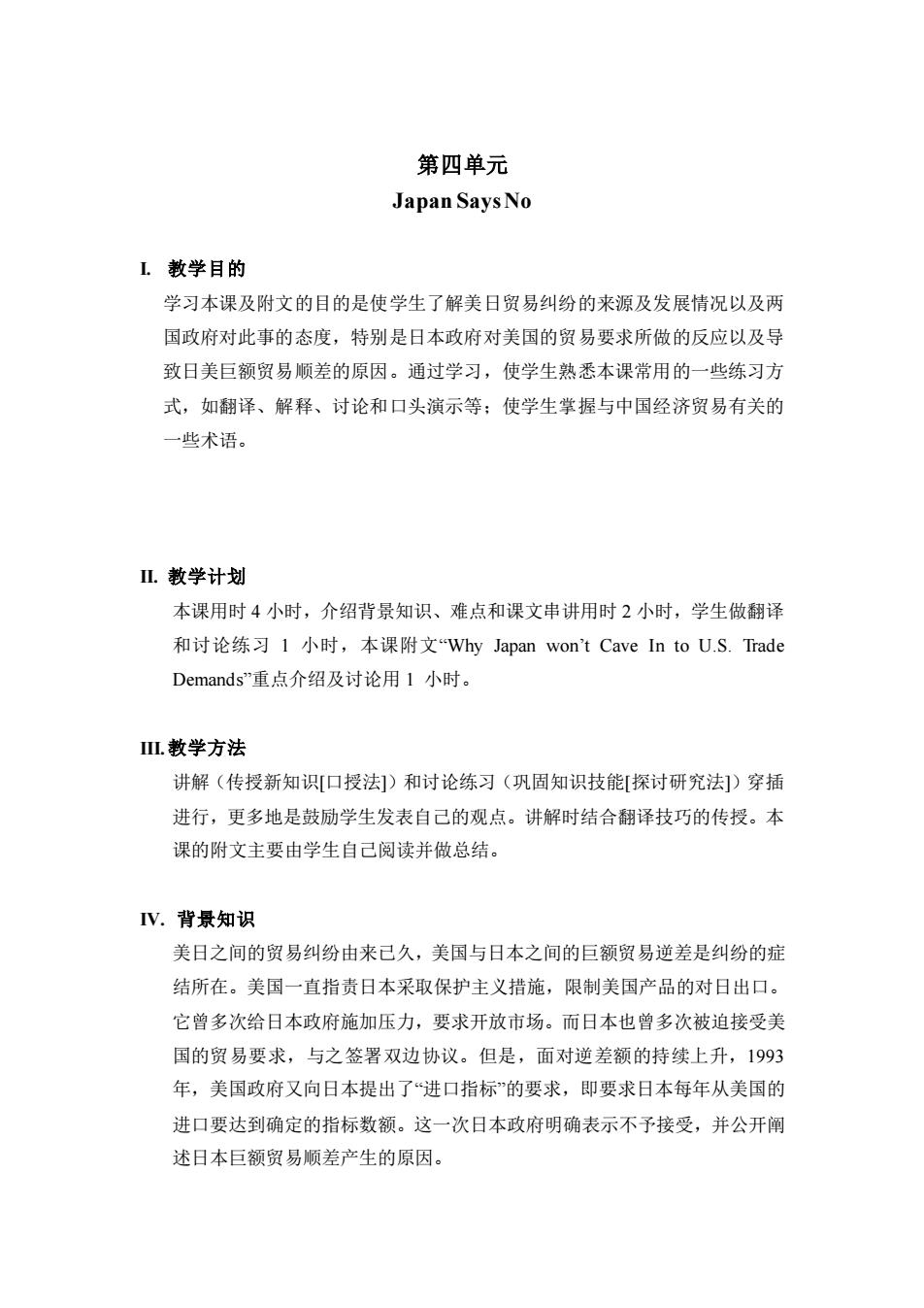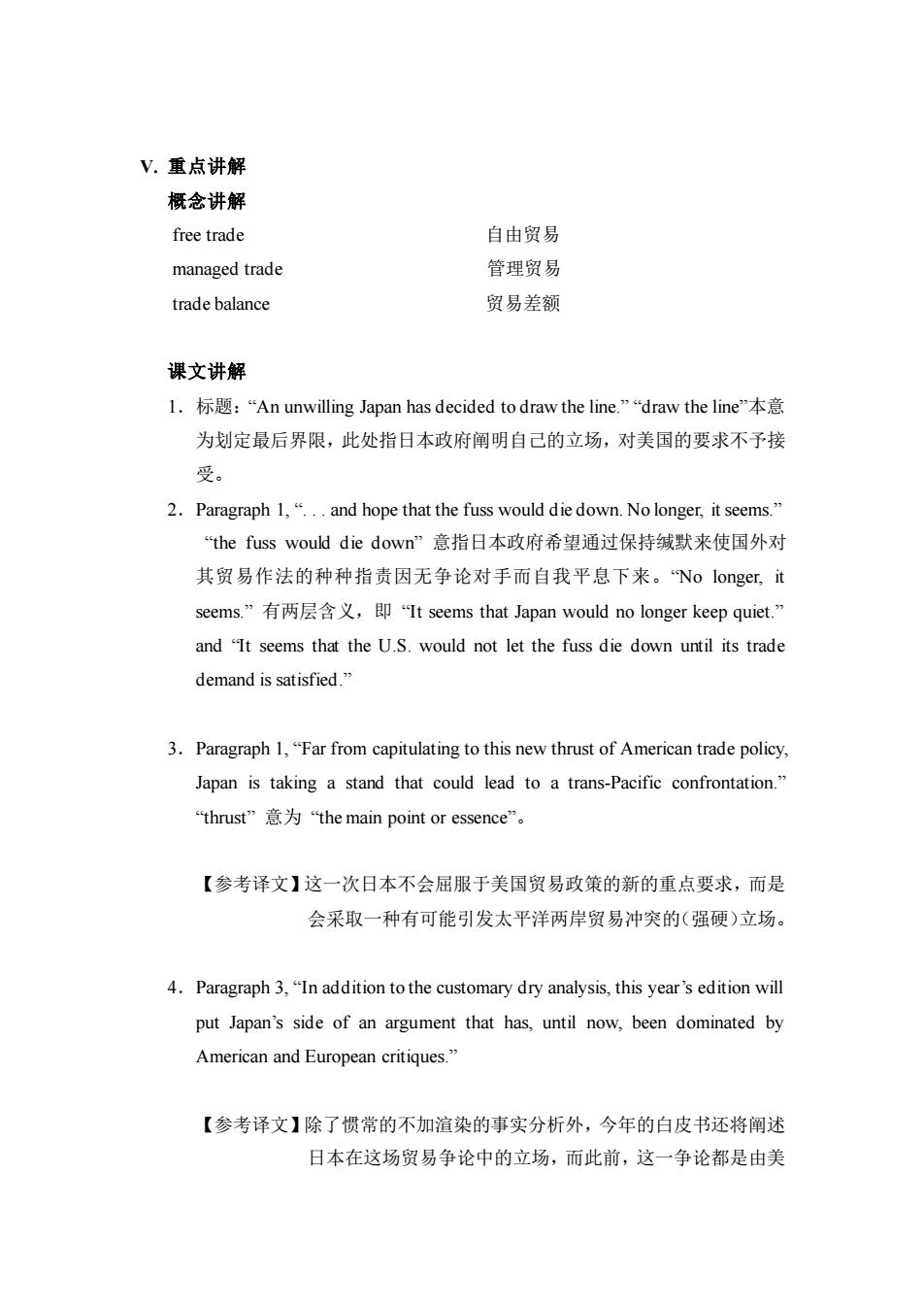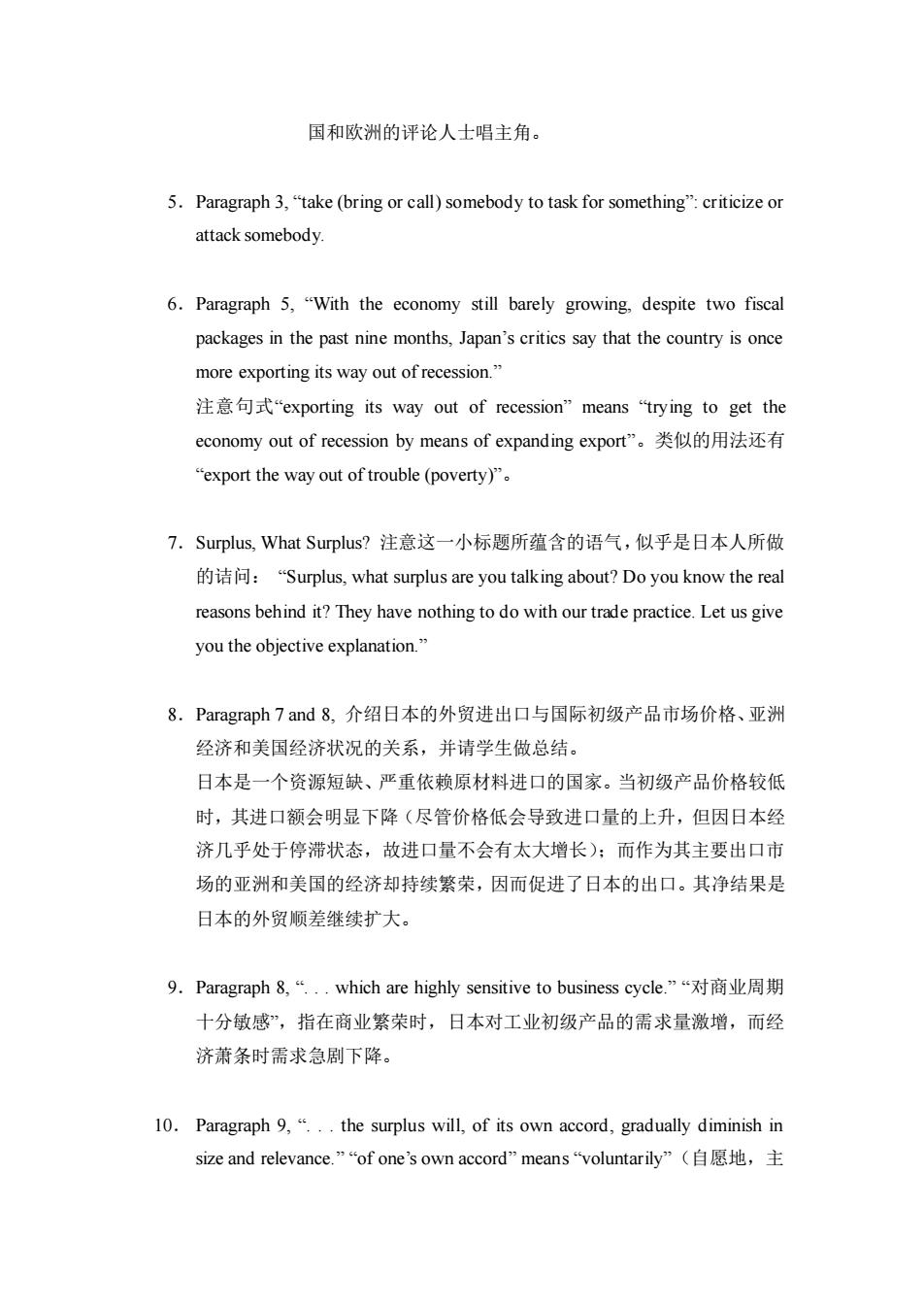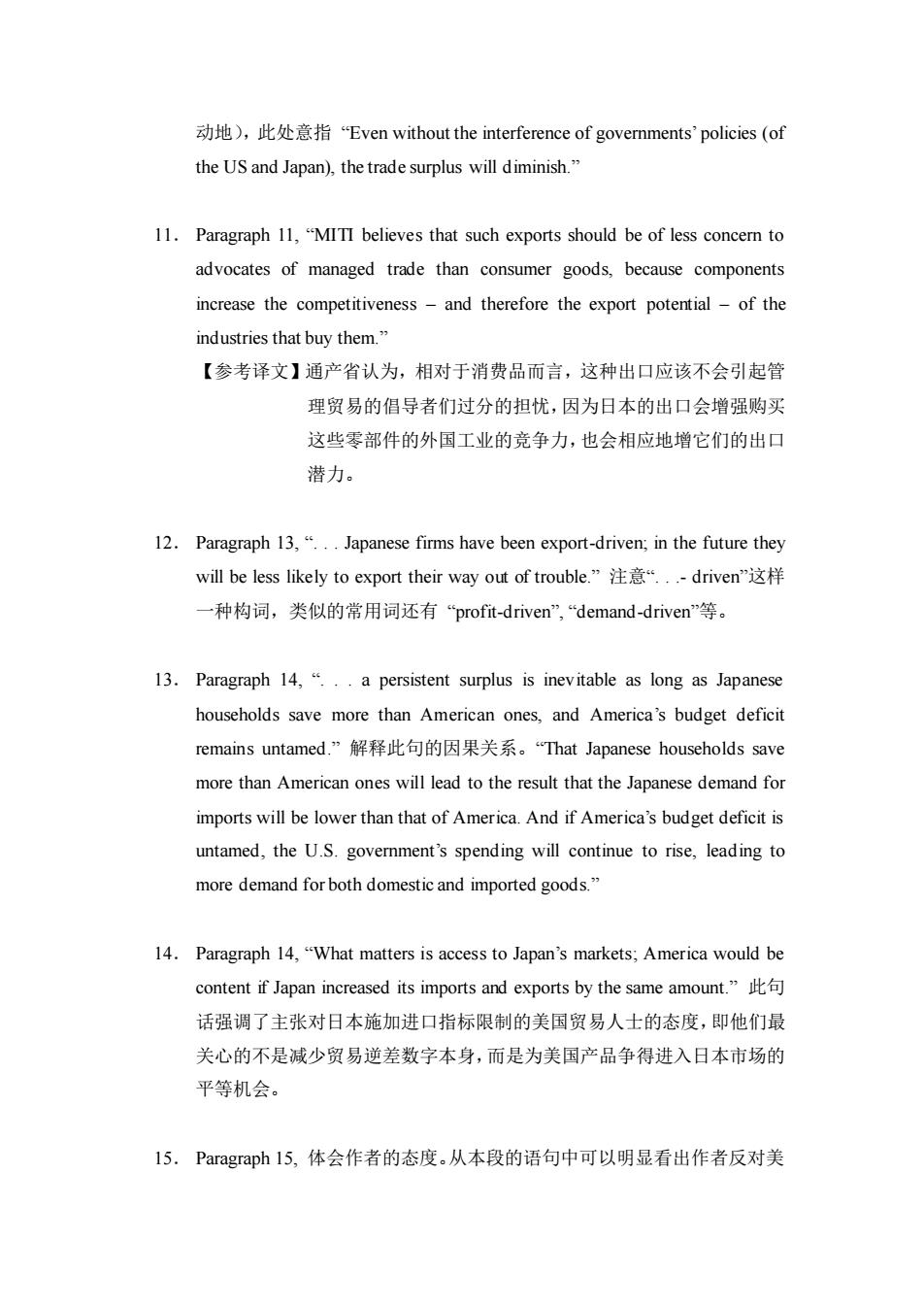
第四单元 Japan Says No L教学目的 学习本课及附文的目的是使学生了解美日贸易纠纷的来源及发展情况以及两 国政府对此事的态度,特别是日本政府对美国的贸易要求所做的反应以及导 致日美巨额贸易顺差的原因。通过学习,使学生熟悉本课常用的一些练习方 式,如翻译、解释、讨论和口头演示等:使学生掌握与中国经济贸易有关的 一些术语。 Ⅱ.教学计划 本课用时4小时,介绍背景知识、难点和课文串讲用时2小时,学生做翻译 和讨论练习1小时,本课附文Why Japan won't Cave In to U.S.Trade Demands”重点介绍及讨论用1小时。 Ⅲ教学方法 讲解(传授新知识口授法])和讨论练习(巩固知识技能探讨研究法])穿插 进行,更多地是鼓励学生发表自己的观点。讲解时结合翻译技巧的传授。本 课的附文主要由学生自己阅读并做总结。 IV.背景知识 美日之间的贸易纠纷由来己久,美国与日本之间的巨额贸易逆差是纠纷的症 结所在。美国一直指责日本采取保护主义措施,限制美国产品的对日出口。 它曾多次给日本政府施加压力,要求开放市场。而日本也曾多次被迫接受美 国的贸易要求,与之签署双边协议。但是,面对逆差额的持续上升,1993 年,美国政府又向日本提出了“进口指标”的要求,即要求日本每年从美国的 进口要达到确定的指标数额。这一次日本政府明确表示不予接受,并公开阐 述日本巨额贸易顺差产生的原因
第四单元 Japan Says No I. 教学目的 学习本课及附文的目的是使学生了解美日贸易纠纷的来源及发展情况以及两 国政府对此事的态度,特别是日本政府对美国的贸易要求所做的反应以及导 致日美巨额贸易顺差的原因。通过学习,使学生熟悉本课常用的一些练习方 式,如翻译、解释、讨论和口头演示等;使学生掌握与中国经济贸易有关的 一些术语。 II. 教学计划 本课用时 4 小时,介绍背景知识、难点和课文串讲用时 2 小时,学生做翻译 和讨论练习 1 小时,本课附文“Why Japan won’t Cave In to U.S. Trade Demands”重点介绍及讨论用 1 小时。 III.教学方法 讲解(传授新知识[口授法])和讨论练习(巩固知识技能[探讨研究法])穿插 进行,更多地是鼓励学生发表自己的观点。讲解时结合翻译技巧的传授。本 课的附文主要由学生自己阅读并做总结。 IV. 背景知识 美日之间的贸易纠纷由来已久,美国与日本之间的巨额贸易逆差是纠纷的症 结所在。美国一直指责日本采取保护主义措施,限制美国产品的对日出口。 它曾多次给日本政府施加压力,要求开放市场。而日本也曾多次被迫接受美 国的贸易要求,与之签署双边协议。但是,面对逆差额的持续上升,1993 年,美国政府又向日本提出了“进口指标”的要求,即要求日本每年从美国的 进口要达到确定的指标数额。这一次日本政府明确表示不予接受,并公开阐 述日本巨额贸易顺差产生的原因

V.重点讲解 概念讲解 free trade 自由贸易 managed trade 管理贸易 trade balance 贸易差额 课文讲解 l.标题:“An unwilling Japan has decided to draw the line.”“draw the line”本意 为划定最后界限,此处指日本政府阐明自己的立场,对美国的要求不予接 受。 2.Paragraph 1,"..and hope that the fuss would die down.No longer,it seems." the fuss would die down”意指日本政府希望通过保持缄默来使国外对 其贸易作法的种种指责因无争论对手而自我平息下来。No longer,it seems.”有两层含义,即It seems that Japan would no longer keep quiet..” and "It seems that the U.S.would not let the fuss die down until its trade demand is satisfied.” 3.Paragraph 1,"Far from capitulating to this new thrust of American trade policy, Japan is taking a stand that could lead to a trans-Pacific confrontation." "thrust'”意为the main point or essence”。 【参考译文】这一次日本不会屈服于美国贸易政策的新的重点要求,而是 会采取一种有可能引发太平洋两岸贸易冲突的(强硬)立场。 4.Paragraph 3,"In addition to the customary dry analysis,this year's edition will put Japan's side of an argument that has,until now,been dominated by American and European critiques." 【参考译文】除了惯常的不加渲染的事实分析外,今年的白皮书还将阐述 日本在这场贸易争论中的立场,而此前,这一争论都是由美
V. 重点讲解 概念讲解 free trade 自由贸易 managed trade 管理贸易 trade balance 贸易差额 课文讲解 1.标题:“An unwilling Japan has decided to draw the line.” “draw the line”本意 为划定最后界限,此处指日本政府阐明自己的立场,对美国的要求不予接 受。 2.Paragraph 1, “. . . and hope that the fuss would die down. No longer, it seems.” “the fuss would die down” 意指日本政府希望通过保持缄默来使国外对 其贸易作法的种种指责因无争论对手而自我平息下来。“No longer, it seems.” 有两层含义,即 “It seems that Japan would no longer keep quiet.” and “It seems that the U.S. would not let the fuss die down until its trade demand is satisfied.” 3.Paragraph 1, “Far from capitulating to this new thrust of American trade policy, Japan is taking a stand that could lead to a trans-Pacific confrontation.” “thrust” 意为 “the main point or essence”。 【参考译文】这一次日本不会屈服于美国贸易政策的新的重点要求,而是 会采取一种有可能引发太平洋两岸贸易冲突的(强硬)立场。 4.Paragraph 3, “In addition to the customary dry analysis, this year’s edition will put Japan’s side of an argument that has, until now, been dominated by American and European critiques.” 【参考译文】除了惯常的不加渲染的事实分析外,今年的白皮书还将阐述 日本在这场贸易争论中的立场,而此前,这一争论都是由美

国和欧洲的评论人士唱主角。 5.Paragraph 3,"take(bring or call)somebody to task for something":criticize or attack somebody. 6.Paragraph 5,"With the economy still barely growing,despite two fiscal packages in the past nine months,Japan's critics say that the country is once more exporting its way out of recession." 注意句式exporting its way out of recession”means "trying to get the economy out of recession by means of expanding export”。类似的用法还有 “export the way out of trouble(poverty)'。 7.Surplus,What Surplus?注意这一小标题所蕴含的语气,似乎是日本人所做 的诘问:“Surplus,what surplus are you talking about?Do you know the real reasons behind it?They have nothing to do with our trade practice.Let us give you the objective explanation." 8.Paragraph7and8,介绍日本的外贸进出口与国际初级产品市场价格、亚洲 经济和美国经济状况的关系,并请学生做总结。 日本是一个资源短缺、严重依赖原材料进口的国家。当初级产品价格较低 时,其进口额会明显下降(尽管价格低会导致进口量的上升,但因日本经 济几乎处于停滞状态,故进口量不会有太大增长):而作为其主要出口市 场的亚洲和美国的经济却持续繁荣,因而促进了日本的出口。其净结果是 日本的外贸顺差继续扩大。 9.Paragraph&,“.,which are highly sensitive to business cycle.”“对商业周期 十分敏感”,指在商业繁荣时,日本对工业初级产品的需求量激增,而经 济萧条时需求急剧下降。 10.Paragraph 9,"..the surplus will,of its own accord,gradually diminish in size and relevance.”“of one's own accord”means“voluntar ily”(自愿地,主
国和欧洲的评论人士唱主角。 5.Paragraph 3, “take (bring or call) somebody to task for something”: criticize or attack somebody. 6.Paragraph 5, “With the economy still barely growing, despite two fiscal packages in the past nine months, Japan’s critics say that the country is once more exporting its way out of recession.” 注意句式“exporting its way out of recession” means “trying to get the economy out of recession by means of expanding export”。类似的用法还有 “export the way out of trouble (poverty)”。 7.Surplus, What Surplus? 注意这一小标题所蕴含的语气,似乎是日本人所做 的诘问: “Surplus, what surplus are you talking about? Do you know the real reasons behind it? They have nothing to do with our trade practice. Let us give you the objective explanation.” 8.Paragraph 7 and 8, 介绍日本的外贸进出口与国际初级产品市场价格、亚洲 经济和美国经济状况的关系,并请学生做总结。 日本是一个资源短缺、严重依赖原材料进口的国家。当初级产品价格较低 时,其进口额会明显下降(尽管价格低会导致进口量的上升,但因日本经 济几乎处于停滞状态,故进口量不会有太大增长);而作为其主要出口市 场的亚洲和美国的经济却持续繁荣,因而促进了日本的出口。其净结果是 日本的外贸顺差继续扩大。 9.Paragraph 8, “. . . which are highly sensitive to business cycle.” “对商业周期 十分敏感”,指在商业繁荣时,日本对工业初级产品的需求量激增,而经 济萧条时需求急剧下降。 10. Paragraph 9, “. . . the surplus will, of its own accord, gradually diminish in size and relevance.” “of one’s own accord” means “voluntarily”(自愿地,主

动地),此处意指Even without the interference of governments'policies(of the US and Japan),the trade surplus will diminish." 11.Paragraph 11,"MITI believes that such exports should be of less concern to advocates of managed trade than consumer goods,because components increase the competitiveness-and therefore the export potential-of the industries that buy them." 【参考译文】通产省认为,相对于消费品而言,这种出口应该不会引起管 理贸易的倡导者们过分的担忧,因为日本的出口会增强购买 这些零部件的外国工业的竞争力,也会相应地增它们的出口 潜力。 12.Paragraph 13,"..Japanese firms have been export-driven;in the future they will be less likely to export their way out of trouble.”注意..-driven”这样 一种构词,类似的常用词还有“profit-driven”,“demand-driven”等。 13.Paragraph 14,"..a persistent surplus is inevitable as long as Japanese households save more than American ones,and America's budget deficit remains untamed.”解释此句的因果关系。That Japanese households save more than American ones will lead to the result that the Japanese demand for imports will be lower than that of America.And if America's budget deficit is untamed,the U.S.government's spending will continue to rise,leading to more demand for both domestic and imported goods." 14.Paragraph 14,"What matters is access to Japan's markets;America would be content if Japan increased its imports and exports by the same amount." 话强调了主张对日本施加进口指标限制的美国贸易人士的态度,即他们最 关心的不是减少贸易逆差数字本身,而是为美国产品争得进入日本市场的 平等机会。 l5.Paragraph 15,体会作者的态度。从本段的语句中可以明显看出作者反对美
动地),此处意指 “Even without the interference of governments’ policies (of the US and Japan), the trade surplus will diminish.” 11. Paragraph 11, “MITI believes that such exports should be of less concern to advocates of managed trade than consumer goods, because components increase the competitiveness – and therefore the export potential – of the industries that buy them.” 【参考译文】通产省认为,相对于消费品而言,这种出口应该不会引起管 理贸易的倡导者们过分的担忧,因为日本的出口会增强购买 这些零部件的外国工业的竞争力,也会相应地增它们的出口 潜力。 12. Paragraph 13, “. . . Japanese firms have been export-driven; in the future they will be less likely to export their way out of trouble.” 注意“. . .- driven”这样 一种构词,类似的常用词还有 “profit-driven”, “demand-driven”等。 13. Paragraph 14, “. . . a persistent surplus is inevitable as long as Japanese households save more than American ones, and America’s budget deficit remains untamed.” 解释此句的因果关系。“That Japanese households save more than American ones will lead to the result that the Japanese demand for imports will be lower than that of America. And if America’s budget deficit is untamed, the U.S. government’s spending will continue to rise, leading to more demand for both domestic and imported goods.” 14. Paragraph 14, “What matters is access to Japan’s markets; America would be content if Japan increased its imports and exports by the same amount.” 此句 话强调了主张对日本施加进口指标限制的美国贸易人士的态度,即他们最 关心的不是减少贸易逆差数字本身,而是为美国产品争得进入日本市场的 平等机会。 15. Paragraph 15, 体会作者的态度。从本段的语句中可以明显看出作者反对美

国对日本进行贸易威胁和制裁,并且认为这样做是无效的。美国应该通过 降低国内的政府预算赤字来来减少贸易逆差
国对日本进行贸易威胁和制裁,并且认为这样做是无效的。美国应该通过 降低国内的政府预算赤字来来减少贸易逆差